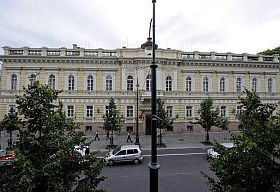Analytics, Economics, Export, Financial Services, Investments, Lithuania
International Internet Magazine. Baltic States news & analytics
Friday, 26.04.2024, 15:47
Economic growth spurred by consumption and investments in Lithuania
 Print version
Print version |
|---|
Economic development is favorable to Lithuania for meeting the euro adoption criteria next spring.
The Bank of Lithuania’s economists provide that this year the country’s economy will grow by 2.8%, while next year – 3.5%.
Economic growth is mostly driven by domestic demand – especially rapid growth of consumption. Its growth projection was increased by 1.4 percentage points, to 4.3%.
"Although consumption and investment are recovering, Lithuania’s economy is still rather vulnerable, due to slow growth in the euro area and unpredictable economic policy in the East. Also unhelpful is the fact that critical social, economic, and public administration reforms essentially are not performed", said Raimondas Kuodis, Deputy Chairman of the Board.
It is projected that this year investments will increase by 7.8%. The need for investment is being felt particularly in industry, where the production capacity utilization rate continues to rise and has surpassed the average level for this indicator. The overall development of investment should be noticeably affected by general government investment as well. For some time they did not increase, but if their investment costs will be as is specified by the 2013–2015 State Investment Program, then these investments will increase.
Newest data shows that export is larger than a year ago; however, the expansion of export is currently at its slowest since the start of economic recovery in 2010. This was impacted by the real GDP which in the main export partners grew less than last year. Of course, the effect of last year’s record-breaking harvest on the growth of the country’s export has already faded.
The consumer-friendly raw material price trends and limited impact of domestic factors on prices allow for the same inflation projections as previously – 1.3% this year and 1.5% next year.
"Price developments and general economic development is favorable for us to meet the euro adoption criteria next spring. However, the budget deficit ratio, close to the threshold of 3%, raises some concerns. Without a reserve for compliance with these criteria, it is important to pay particular attention to the discipline of public finances", says Ruta Rodzko, Director of the Economic and Financial Stability Service.








 «The Baltic Course» Is Sold and Stays in Business!
«The Baltic Course» Is Sold and Stays in Business!

